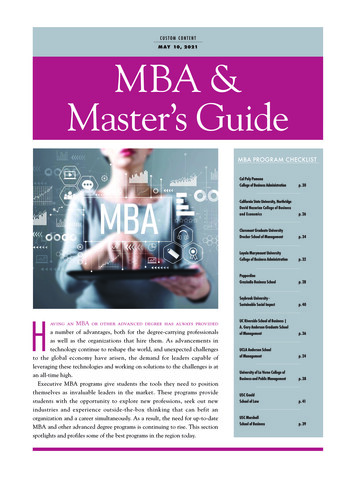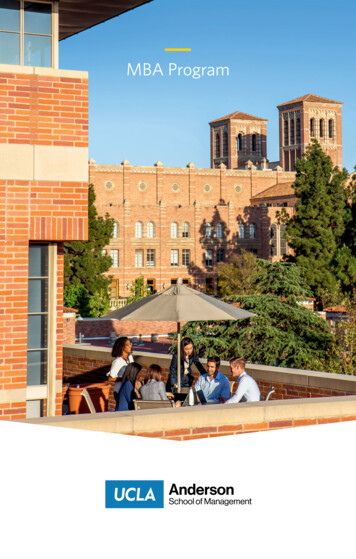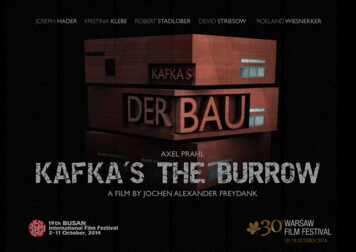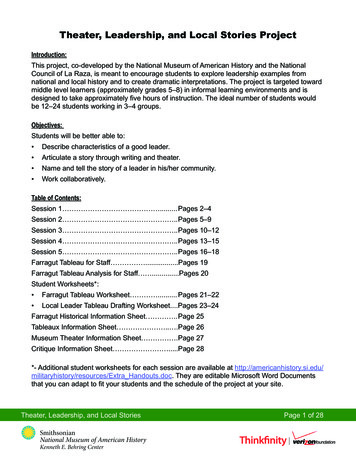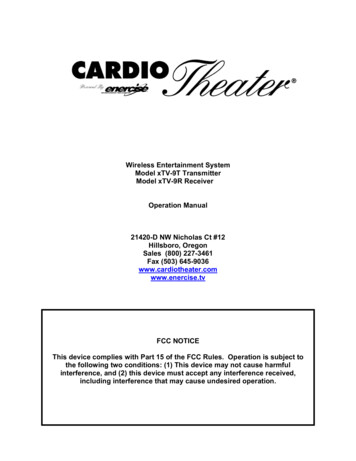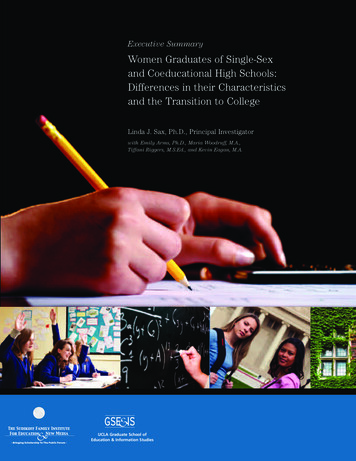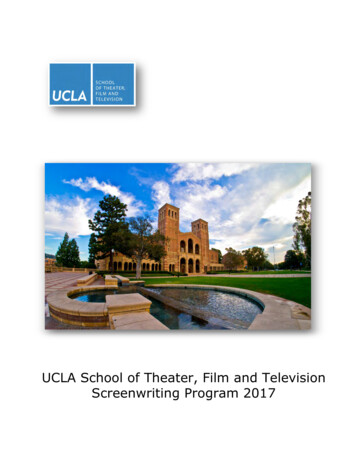
Transcription
UCLA School of Theater, Film and TelevisionScreenwriting Program 2017
Table of ContentsABOUT THE UCLA TFT SCREENWRITING PROGRAM. 3The Students . 3The Faculty . 4The Alumni . 5SCREENWRITING PROGRAM CURRICULUM . 6Course Requirements . 6a)Core I. 6b)Outside M.F.A. Requirement. 6c)Cinema and Media Studies Requirement . 7SCREENWRITING PROGRAM FACULTY. 8SCREENWRITING PROGRAM COURSES . 9Undergraduate Courses . 9Graduate Courses . 10ADMISSION REQUIREMENTS . 11Application Procedure . 11FREQUENTLY ASKED QUESTIONS . 12Applying . 12The Program . 13Cost and Funding. 14Contact . 142
ABOUT THE UCLA TFT SCREENWRITING PROGRAMThe two-year Master of Fine Arts in Screenwriting program encourages students toconcentrate upon the challenge of writing a well-structured story inhabited by vivid,compelling characters. The elements of character, dialogue, scene, setting, texture,style and tone are explored through an intensive workshop process."The great misconception among new and untested writers is that screenwriting iseasy," says screenwriter and Lecturer Emeritus Hal Ackerman, the former co-headof the UCLA Screenwriting Program. "Trust me, it's harder than it looks. Thebeauty of a great artist, like a great athlete, is the ability to make somethingamazingly difficult and complex look easy."Screenplay writing is a rigorous craft and, at its best, an art. In UCLA TFT'sScreenwriting Program students learn all the key elements of creating scripts forfeature film and television, including story structure, plot, scene development,characterization and dialogue. The goal is to prepare students to turn their stories intoscreenplays. A series of writing assignments guide them toward mastering the basics,which are used to conceptualize and begin work on their scripts.Samuel Goldwyn Award WinnersThe StudentsSCREENWRITING PROGRAM students are passionate storytellers. They are drivento succeed and stand out given their creative passion and their business acumen.They are self-starters and understand that every good piece of entertainment startswith the script.The ideal SCREENWRITING PROGRAM student reflects the cultural diversity of theglobal filmmaking community and includes many women, people of color andstudents from abroad.It is the expressed goal of the UCLA SCREENWRITING PROGRAM to provide studentswith the creative tools to work in film, television and digital media. Our School credois "Creating What's Next," and our students are equipped with the knowledge andexperience to succeed in today's global market.3
Head of screenwriting and professor, Richard Walterinterviewing TFT alumnus and Academy Awardwinner Alexander PayneThe FacultyThe UCLA TFT SCREENWRITING PROGRAM faculty is comprised ofdistinguished scholars and internationally recognized professionals in the fields offilm, television and new media.In addition, an impressive roster of top industry professionals who teach on a parttime basis round out the regular faculty. Industry leaders in their chosen fields, thesevisiting professors include studio and network presidents and senior executives,Oscar-winning and top-grossing producers, showrunners, and top agents andlawyers. Faculty who regularly teach courses include Dustin Lance Black (Milk), AnaLily Amirpour (A Girl Walks Home Alone at Night), Marianne & Cormac Wibberley(National Treasure: Book of Secrets) and Iris Yamashita (Letters from Iwo Jima).Please visit dia-department/ to seetheir impressive biographies.4
The AlumniThe UCLA TFT SCREENWRITING PROGRAM is the most successful in the world. Ourscreenwriters have received five Academy Award nominations in the past few years,winning three. UCLA TFT graduates have written blockbuster screenplays includingAvatar, The Curious Case of Benjamin Button, The Descendants, Eagle Eye, Face/Off,Forrest Gump, Indiana Jones 2 and 3 and the upcoming fifth installment, Iron Man 3,the complete Jurassic Park franchise, Men in Black, Milk, Munich, Sideways, SpiderMan, The Terminal and War of the Worlds, to name a few.In addition, recent television credits include HBO's Insecure, OWN's Queen Sugar,Netflix's 7 Seconds, CBS’ Elementary, Criminal Minds: Beyond Borders, and Scorpion,CBS AllAccess' Star Trek, CW’s Reign, NBC’s SuperStore, Freeform’s Dead of Summerand The Fosters, Amazon's Mozart in the Jungle and Gortimer Gibbons Life on NormalStreet, Crackle's StartUp, AMC’s Better Call Saul, VH1's The Break, Disney Channel’sTangled, MTV’s Awkward, Showtime's I'm Dying Up Here, SyFy’s Helix and TheMagicians, Sony AXN' Absentia, TNT’s Animal Kingdom, and Pose for FX.Dustin Lance Black, screenwriter andAcademy Award winner for MilkUCLA TFT SCREENWRITING PROGRAM graduates include Dustin Lance Black (Milk, J.Edgar), Francis Ford Coppola (The Godfather), Dean Hargrove (Columbo), David Koepp(Spider Man), Josefina Lopez (Real Women Have Curves), Michael Miner (RoboCop), BrianNelson (Hard Candy), Alexander Payne (Nebraska, The Descendants), Gil Keran(Poltergeist), Gina Prince-Bythewood (Beyond the Lights), Irving Ravetch and HarrietFrank Jr. (Norma Rae), Gore Verbinski (Pirates of the Caribbean), Scott Rosenberg (HighFidelity), John Strauss (There's Something About Mary), David S. Ward (The Sting), EricRoth (Forrest Gump) and Caroline Williams (Miss/Guided).5
UCLA TFT SCREENWRITING PROGRAM CURRICULUM1. Course RequirementsThe SCREENWRITING PROGRAM has the following time-to-degree requirement: aminimum of six quarters; maximum of 10 quarters. The minimum total units required tograduate is 72 units (18 courses).a. Required Courses:Course #RequiredCourse or Series TitleQuarterFIRST-YEAR CURRICULUMC430 (2 units) Introduction to Screenwriting FundamentalsRequiredFall431 (4 units)Introduction to Film and TelevisionScreenwritingRequiredFall438 (48units)Advanced ScreenwritingRequiredWinter, SpringSECOND-YEAR CURRICULUMChoose fromthese options:Two Advanced Screenwriting (FTV 343)Fall, Winter, SpringTwo Drama Pilots AND One Comedy PilotFall, Winter, SpringTwo Comedy Pilots AND One Drama PilotFall, Winter, Springb. MFA Course Requirement:Students have to take a minimum of ONE course either Directing/Production, Animation,and/or Producers Program area.Production/Directing188B188D403A459 AB472Introduction to the Art & Technique of FilmmakingFilm Editing: Overview of History, Technique and PracticeAdvanced Documentary WorkshopDirecting for Film and tion to AnimationWriting for AnimationAnimation WorkshopFall, Spring, SummerFall onlyWinter, SpringProducers C296ABFallFallCheck registrar’s scheduleFilm StructureCreative ProducingFeature Film DevelopmentFeature Film Production, Marketing and DistributionNetwork Television & Emerging PlatformsContracts & NegotiationsInternational Financing & DistributionCurrent Business Practices in Film and TelevisionIdentifying Your Assets; Advanced Producing 1 & 2Talent Representation6Check registrar’s scheduleCheck registrar’s scheduleCheck registrar’s scheduleCheck registrar’s scheduleCheck registrar’s scheduleCheck registrar’s scheduleCheck registrar’s scheduleCheck registrar’s scheduleCheck registrar’s scheduleCheck registrar’s schedule
c. Required Cinema and Media Studies CoursesStudents must take a minimum of TWO graduate-level Cinema & Media Studies courses.Please see list below for approved course numbers and titles.Please note that not all courses are offered every quarter. Students should consult theregistrar’s schedule for available courses and class times. For courses in the 298 series, whichis a temporary course number and may be used by any program in the department, studentsshould consult the graduate advisor first to check whether a course fulfills the CMSrequirement.Cinema & Media Studies201202203204206A206BMedia Industries and Cultures of ProductionMedia Audiences and Cultures of ConsumptionFilm and the Other ArtsVisual AnalysisEuropean Film HistorySelected Topics in American Film History206C** American Film History206D Silent Films207Experimental Film208B** Classical Film Theory208C Contemporary Film Theory209A Documentary Film209B Fictional Film209D Animated Films217A American Television History217B Selected Topics in Television HistoryCulture, Media and Society218219Film and Society220TV & Society221Film Authors222Film Genres223Visual Perception224Computer Applications for Film Study225Videogame Theory246Electronic Culture270Film Criticism271276277298ABTelevision CultureNon-Western FilmNarrative StudiesSpecial Studies (select classes must see Graduate Counselor)** May be core course for M.A. students and not available that particular quarter for M.F.A. students.2. WRITTEN REQUIREMENTSA minimum of four feature length screenplays must be completed while enrolled in FTV 434before advancing to candidacy. Students may substitute two feature length screenplays withtwo drama pilots and comedy pilot OR two comedy pilots and one drama pilot. All pilotsmust be accompanied by series bibles. This writing is accepted as a body of work for theMasters Thesis requirement and must be approved by the Candidate's Thesis Chair.7
UCLA TFT SCREENWRITING PROGRAM FACULTYLadder FacultyProfessor Richard Walter is a celebrated storytelling educator, movie industry expert andthe Area Head of the graduate screenwriting program at UCLA TFT.A screenwriter and widely published author, his books include the novels Escape From FilmSchool and Barry and the Persuasions and the non-fiction works The Whole Picture:Strategies for Screenwriting Success in the New Hollywood, Screenwriting: The Art, Craft andBusiness of Film and Television Writing and his most recent, Essentials of Screenwriting. Thelatter is available also in Mandarin from its Chinese publisher.Walter has written numerous feature assignments for the major studios and has sold materialto broadcast networks. He has also written many informational, educational and corporatefilms. He lectures on screenwriting and storytelling throughout the world. He has conductedmaster classes in London, Paris, Jerusalem, Madrid, Rio de Janeiro, Mexico City, Beijing,Sydney and Hong Kong.Walter's former students, Alexander Payne and Dustin Lance Black, earned Academy Awards inscreenplay categories: Payne’s The Descendants (2011) and Sideways (2004), and Black’s Milk(2008).LecturerNeil Landau ('85), associate director of screenwriting for television, teaches in the M.F.A.screenwriting and producing programs at UCLA TFT. He also facilitates a first-look writingthe one-hour drama development workshop at UCLA for Sony Crackle (this initiative isnow in its 4th year).Landau is an award-winning screenwriter, creative producer and bestselling author. Hisscreen credits include the cult comedy Don't Tell Mom the Babysitter's Dead starringChristina Applegate; Melrose Place, The Magnificent Seven, Doogie Howser, M.D., The SecretWorld of Alex Mack, Twice in a Lifetime, MTV's Undressed, The Young & the Restless,Monarch Cove, and one-hour drama pilots for CBS, ABC, ABC Family (aka Freeform), WarnerBros., Disney, Lifetime, and Freemantle. His animated movie projects include the animatedfeature Tad: The Lost Explorer (aka Las Adventuras de Tadeo Jones) for which he earned aSpanish Academy “Goya” Award and Cinema Writers’ Circle Award for Best AdaptedScreenplay (2013). Tad2 is currently in production for a 2017 release, also from Paramount.Tad3 is currently in development. Neil co-wrote and served as Co-Executive Producer on theanimated feature Capture the Flag for Paramount; and the animated movie, Sheep & Wolves,for Wizart Animation (The Snow Queen), 2017 release.Landau is the author of the bestselling books 101 Things I Learned in Film School (GrandCentral Publishing, 2010); The Screenwriter’s Roadmap (Focal Press, 2012, now in 10languages); and The TV Showrunner’s Roadmap (Focal Press, 2014, now in five languages).His latest book, TV Outside the Box: Trailblazing in the Digital Television Revolution, publishedby Focal Press/Taylor & Francis/Routledge, was sponsored by NATPE. His new book, TV Writingon Demand: Creating Great Content in the Digital Era will be published in Fall, 2017.He served for several years as Executive Script Consultant in the international divisions of SonyPictures Television and Columbia Pictures. Landau gives lectures and hosts workshops aroundthe world on the art and craft of screenwriting, including USC School of Cinematic Arts, NYUTisch School of the Arts, La Femis in Paris, Met Film School in London, University of the Andesin Santiago, Alexander Mitta Film School in Moscow, and Hebrew University in Jerusalem.8
Linda Voorhees is the associate director of screenwriting for film at UCLA TFT. An awardwinning writer who has worked for ABC, CBS, NBC, TNT, Lifetime, USA and Disney Channel,Voorhees has been or is currently in development with Columbia, Universal, Touchstone andHollywood Pictures.As a student at the UCLA School of Theater, Film and Television, she was the recipient of theJack Nicholson Screenwriting Award and a four-time finalist for the Diane Thomas Award. Her1997 movie of the week, Two Mothers for Zachary, received the GLAAD Award for positiveportrayals of gay and lesbians in the media. Her 1991 made-for-cable movie, Crazy From theHeart, was the winner of the Imagen Award for positive portrayals of Latinos and Hispanics inthe media and was the winner of the Columbus Award. The screenplay was nominated for anACE Award.UCLA TFT SCREENWRITING PROGRAM COURSESUndergraduate CoursesFTV C132. Screenwriting FundamentalsExamination of screenwriting fundamentals: structure, character and scene development,conflict, locale, theme, history of drama. Review of authors such as Aristotle. Concurrentlyscheduled with course C430. P/NP or letter grading.FTV 133. In-Depth Introduction to Fundamentals of ScreenwritingStructural analysis of feature films and development of professional screenwriters'vocabulary for constructing, deconstructing and reconstructing their own work. Screenings offilms and selected film sequences in class and by assignment. P/NP or letter grading.FTV 134. Intermediate Screenwriting WorkshopProblems in film and television writing.FTV 135A. Advanced Screenwriting WorkshopCourse in film and television writing. The first act of an original screenplay will be developed.FTV 135B. Advanced Screenwriting WorkshopCourse in film and television writing. The second act of an original screenplay will bedeveloped.FTV 135C. Advanced Screenwriting WorkshopCourse in film and television writing. The third act of an original screenplay will be developed.Letter grading.9
Graduate CoursesFTV 283A. Writing the Half-Hour Speculative Episode for an Existing Comedy SeriesBasic tenets and analysis of television comedy shows and contemporary industry productionand business practices. Students will each write a sample script from a curated menu of currentofferingsFTV 283B. Writing Television Comedy ScriptsThis class examines the basics of the half-hour pilot — format, style and content — anddiscusses the logic and need behind choices that networks make in picking pilots. This class is aforum in which ideas and issues are discussed with both the instructor and class. Weeklyprogress on an original half-hour pilot is required.FTV 283C. Running Television Comedy RoomPractical knowledge about the skills necessary to a writer/executive producer of a half-hourcomedy series. The class focuses on the community building, collaboration and leadership skillsneeded to successfully function in a writers' room, as well as breaking stories, writing andrewriting television scripts.FTV 284A. Writing the One-Hour Speculative Episode for an Existing Comedy SeriesFocuses on the basic tenets and analysis of television drama shows as well as contemporaryindustry production and business practices.FTV 284B. Writing Television Drama ScriptsThis class examines the basics of the drama pilot — format, style and content — and discussesthe logic and need behind choices that networks make in picking pilots. This class is a forum inwhich ideas and issues are discussed with both the instructor and class. Weekly progress on anoriginal drama pilot is required.FTV 284C. Running Television Drama RoomSeminar, three hours. Enforced requisite: Course 284A. Practical knowledge about the skillsnecessary to be a writer/executive producer of a one-hour drama show. Focus is placed oncommunity building, collaboration, and leadership skills needed to successfully function inwriter's room, as well as breaking stories, writing and rewriting television scripts.FTV C430. Screenwriting FundamentalsExamination of screenwriting fundamentals: structure, character and scene development,conflict, locale, theme, history of drama. Review of authors such as Aristotle.FTV 431. Introduction to Film and Television ScreenwritingIntroductory course in problems of film and television screenwriting. S/U or letter grading.FTV 434. Advanced ScreenwritingAdvanced problems in writing of original film and screenplays. May be repeated multiple times.FTV 435. Advanced Writing for Short Film and Television ScreenplaysConception, development and writing of a dramatic film script to be produced as an advancedor thesis project.10
ADMISSION REQUIREMENTSThe UCLA TFT SCREENWRITING PROGRAM is a full-time program. Applicants are only admittedfor Fall quarter, and applications are due one year in advance. Admission to theSCREEENWRITING PROGRAM is highly competitive; less than 10% of applicants are admittedeach year. The Program looks for three qualities in prospective students:1. Have they demonstrated a commitment to a career in screenwriting?2. Do they have a sense of storytelling and the level of creativity that the programrequires?3. Have they demonstrated that they are "self-starters" who are able to generate theirown goals and find the means to achieve them?Application ProcedureAll Theater, Film and Television degree programs are full-time only. We only acceptstudents for the Fall Quarter. The application deadline is November 1 of the preceding year.To start your application, please go mapplicationdeadline:§Print and complete the Departmental application. Choose M.F.A – ScreenwritingProgram. Please submit by mail.§Complete and submit the following supplemental information. All written supportingmaterial must be typed and on 8-1/2 x 11 paper with at least a 12-point font. The lengthsindicated are the maximum allowed. Make sure your name is on each page and that allpages of each section are stapled together.§A creative writing sample§Can include screenplays, short stories, plays, poetry, etc.§While there is no page limitation to the creative writing, it is recommendthat you send no more than 200 pages of your best work.§Two official transcripts from all undergraduate and graduate work are required.NOTE: Community college transcripts are not necessary, as the coursework will bereflected on your undergraduate transcript. Please have transcripts sent to address belowor include sealed envelope in application packet.§Statement of Purpose. Please submit a hard copy of the uploaded document by mail.Explain career goals and potential as a screenwriter.§Three Letters of Recommendation. Please enter the names and other informationabout your recommenders in the online Graduate Division Application. Letters may besubmitted electronically or by mail.§A Resume. Please send by mail.§For International Applicants whose first language is not English, official test resultsfrom the Test of English as a Foreign Language (TOEFL) or the International EnglishLanguage Testing System (IELTS) IS REQUIRED. TOEFL UCLA institution code: 4837 /Department code: 83. For more information about the UCLA TOEFL requirements, clickhere.11
§All international applicants must submit the Confidential Financial Statement. Pleaseupload online.Please note that the Graduate Record Exam (GRE) is not required for M.F.A. applicants.Please send all items designated “Please submit by mail” to:Recruitment and AdmissionsUCLA Department of Film, Television and Digital Media103 East Melnitz Hall, Box 951622Los Angeles, CA 90095-1622For further questions about the graduate applications in Film, Television & Digital Media,please contact filmgrad@tft.ucla.edu.FREQUENTLY ASKED QUESTIONSApplying1. Are there any guidelines I should follow when doing the creative writingrequired with the UCLA TFT SCREENWRITING PROGRAM?In the sample you provide, present fresh original ideas in your unique authentic voice thatrepresents who you are as an individual and is indicative of the body of work you would like tocreate in our program.2. Are the letters of recommendation also due by November 1?Your application has to be submitted by November 1. There is a grace period of one weekfor letters of recommendation that are sent by the recommenders directly.3. Do you require the GRE (Graduate Record Exam)?The GRE is not required if you are applying for any M.F.A. program in the Department of Film,Television and Digital Media. However, if you have taken the exam and feel your resultssupport your application favorably, you may submit them.4. Do you accept students with a GPA lower than 3.0?No. In fact, most successful applicants’ GPAs are usually much higher.5. If I am an international student and my first language is English, do I have totake the TOEFL test?Generally, you're not required to take the TOEFL test if:– English is your first language, or– If you hold a university degree from a university located in the United States or in anothercountry in which English is both the primary spoken language and the medium ofinstruction.But to be sure, you should check the requirements by the Graduate Division TLREQT.HTM12
6. When deciding whether or not to admit an applicant, how much does theapplicant’s experience matter?We evaluate students on a case-by-case basis and look at the student's overall application,including his/her portfolio. There is no set standard as to the level of experience or agerequired. We have had exceptional candidates straight out of college, and we have had thosewith some years of work experience under their belt. If you can, it is always a good idea tosupplement your education with internships or practical experience in filmmaking.7. If I am interested in applying to UCLA’s TFT SCREENWRITING PROGRAM, should Imajor in Film as an undergraduate?We accept applicants with degrees in majors other than film. In fact, we encourage students tocome with a strong, solid humanities background, as that knowledge and schooling willcontribute to a more well-rounded individual.8. Can I apply to the UCLA TFT SCREENWRITING PROGRAM if I have aBachelor of Science (BS) degree, or do I have to have a Bachelor of Arts(BA) degree?You may apply with a BS degree.The Program1. How long is the UCLA’s TFT M.F.A. SCREENWRITING PROGRAM?The Screenwriting Program is a two-year program over six quarters; we are on a quarter(or trimester) system – three quarters equal one academic year.2. What is the UCLA TFT SCREENWRITING PROGRAM philosophy onartistic self-expression versus writing what will sell in the marketplace?At UCLA we put a strong emphasis on developing each unique screenwriter's artisticvoice. We only have one rule: "Don't be boring." Rather: incite, excite, provoke, inspire andentertain. Write the script only you can write. Tell the story only you can tell. We set the barhigh: The goal is originality, authenticity and excellence. We usually look for "creativeentrepreneurs" – i.e., people who have a strong artistic point of view and passionatestorytelling skills.3. How diverse is the student body in the Department of Film, Television andDigital Media?The film school has a very diverse student body of students from all walks of life,ethnicities, nationalities and backgrounds.4. Does the UCLA TFT SCREENWRITING PROGRAM offer alternatives to thefull-time M.F.A. program?Yes. We offer an intensive six-week Summer Institute in Screenwriting for undergraduateswho are interested in a career in producing. The Summer Institute also provides students withan internship in the Industry. Please visit the Undergraduate Summer Institute inScreenwriting website for more information: g/overview.htm13
For those who already have an undergraduate degree, we also offer the UCLA ProfessionalProgram in Screenwriting. This graduate-level non-degree program is modeled after theM.F.A. SCREENWRITING PROGRAM at UCLA TFT and has academic oversight by the UCLASchool of Theater, Film and Television. Classes are taught by both regular UCLA TFT facultyand distinguished industry professionals.For more information, please visit: www.filmprograms.ucla.eduCost and Funding1. Can I work full-time while enrolled in the UCLA SCREENWRITING PROGRAM?The program is a full-time program. We usually do not recommend full-time employment whileyou are enrolled, especially in the first year. While many of our courses are taught at night(since many of our instructors are industry professionals who graciously donate their time),there are still some daytime classes, especially in the first year. In the past we have hadstudents who continued a full-time industry job while enrolled, but it is not for the faint ofheart. Those students usually got concessions from their employers to attend certain daytimeclasses.2. How much does the UCLA SCREENWRITING PROGRAM cost? Do you offerfellowships?Current fees can be found on the registrar’s website: http://www.registrar.ucla.edu/Fees/tftfee.htm and fellowship information can be found by visiting: http://www.gdnet.ucla.edu/asis/entsup/finsup.htm3. Does the UCLA SCREENWRITING PROGRAM offer scholarships for internationalstudents?Entering international students may receive up to 10,000 for their first year of study. Inaddition, we offer five graduate assistantship positions, which come with a salary and partialtuition remission. These are offered on a competitive basis to all second-year students.4. Do you offer teaching assistantships that pay a stipend and cover tuition?We offer some graduate work-study positions for students in their first year and graduateassistantship positions to five students in their second year. The graduate assistantshippositions are typically awarded on a competitive basis and come with a partial tuition remissionand a salary.5. How do I get more information about getting student loans and repaymentplans for the loans?Information for the office that handles Student Loans for students at UCLA can be found at:http://www.loans.ucla.edu/.This office also has information on the variety of loan repayment plans which you can findat: .html.ContactRecruitment and Admissions TeamUCLA School of Theater, Film and Television Office102 East Melnitz HallLos Angeles, CA 90095Phone: (310) 206-8441E-mail: filmgrad@tft.ucla.edu Web: www.tft.ucla.edu14
screenplay writing is a rigorous craft and, at its best, an art. in ucla tft's screenwriting program students learn all the key elements of creating scripts for feature film and television, including story structure, plot, scene development, characterization and dialogue. the goal is to prepare students to turn their stories into screenplays. a
